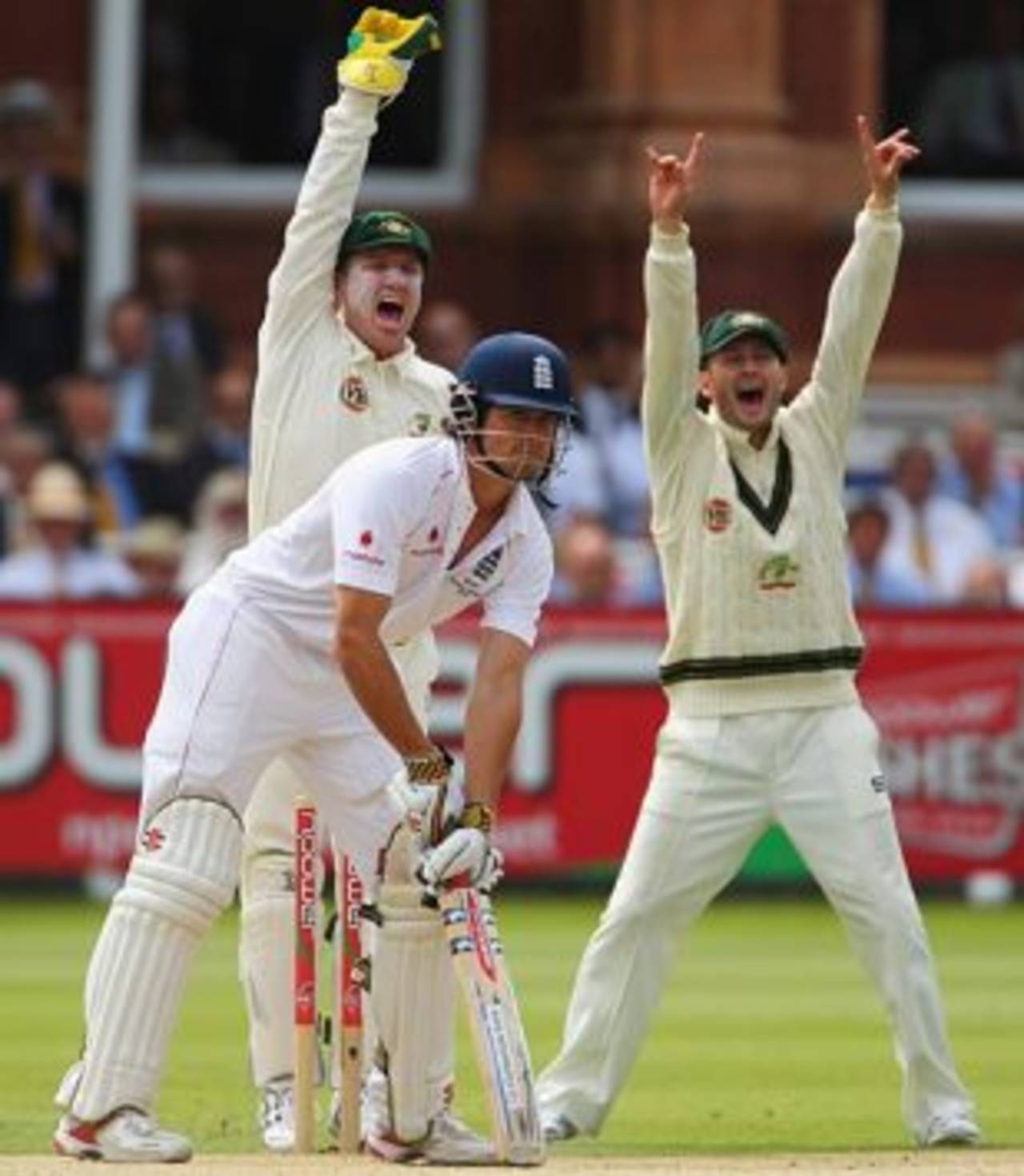The eye-catching stat about England's victory is that it is their first at Lord's over Australia
for 75 years. But that fact, irresistible as it is, is a bit random. A more revealing fact is that this was England's first emphatic win in a live Ashes Test for 12 years. All their victories since - all six of them, scattered through 31 Tests - had been either narrow or consolatory. Four were narrow, three mere consolation (one was both). In two of them, Mark Butcher made hundreds; in one, Andy Caddick took 10 wickets, in what turned out to be his final Test. There were glory days for Dean Headley and Phil Tufnell, and match-winners' medals for Mark Ramprakash, John Crawley and Richard Dawson.
So the parallel here is not just with 2005, when England were so nearly 0-2 down, as they were almost 0-1 down a week ago. It is with 1997, when the first Test,
at Edgbaston, was close to being a mirror image of
Lord's 2009. England shot Australia out cheaply, then made a big score built on one formidable partnership (for Strauss and Cook, read Nasser Hussain and Graham Thorpe, who added 288). They allowed Australia to make more in their second innings than they should have (477), but not as many as they could have (they had been 327 for 1). And they knocked off the runs comfortably, powered by an exultant crowd, just as Andrew Flintoff fed off the fans yesterday.
And then it all went wrong. In their next innings, England were
all out for 77. They escaped with a rain-assisted draw, but Australia won the next three Tests. Two things happened: England choked, and Australia's champions asserted themselves - Glenn McGrath took eight for 38 at Lord's, Steve Waugh made two hundreds
at Old Trafford, and Jason Gillespie grabbed a seven-for
at Headingley, where a young larrikin called Ricky Ponting made his first Test hundred. They also had Shane Warne.
Will this piece of history repeat itself? England are certainly capable of choking. Even at Lord's, in the midst of a fine performance, you could see them getting vertigo when on top. After Cook was out on Thursday afternoon, England lost all 10 wickets for 229, on a flattish pitch, against a thinnish attack. They then bowled very well, inducing a collapse themselves (six for 49), only to take their foot off the gas - or the throat, take your pick - and allow the last two wickets to add 63.
The narrow decision not to enforce the follow-on was the right one, and not just because it had a happy ending. As Scyld Berry spotted and the massed ranks of ex-pros didn't, recent follow-ons have tended to be followed on by key England bowlers suffering serious injury - Simon Jones in 2005, Flintoff in 2006, Ryan Sidebottom last year.
But England still had a bit of choking to do. They teetered when Ravi Bopara and Kevin Pietersen were together, as two normally bullish cricketers got bogged down in a personal quest for form. They blinked when Strauss made his declaration, which managed to eliminate the draw (anathema to an Aussie) while failing to snuff out the faint chance of a glorious win (red rag to an Aussie). And they wobbled again when Michael Clarke and Brad Haddin were mounting their inspired fightback. Strauss's field placings were often bizarre: two slips and a gully, for the new ball, when the other side are five down and you're pressing for victory? Flintoff, fired up by reading his own rather mixed obituaries, saw the need to attack. He supplied both the cutting edge and the sense of being in charge that Strauss, for all his many qualities, has still to muster. It took a showman to run the show.
Most Aussie seamers find an English length an elusive thing. So congratulations to Ben Hilfenhaus, who has located it rapidly. And a message to Ponting: get Stuart Clark in your team fast. Siddle may huff and puff, but Clark just might blow our Strauss down
Knowing England, there will be more wobbles to come. They have two crocked superstars, a problem at number three, and lingering brittleness in the middle order. But there are two reasons why they should upset the rankings and win this series now. One is that Australia have so few champions left to ride to their rescue. The other, not unrelated, is that most modern Australian bowlers, in contrast to the batsmen, find England an inhospitable place.
If you look at Ashes Tests in England this decade, Mitchell Johnson and Peter Siddle, with their averages for this series up in the forties, are following in the laboured footsteps of Michael Kasprowicz (four wickets at 62), the elderly Gillespie (22 at 43), Shaun Tait (five at 42) and Brett Lee (29 at 45). Australia's third best bowler in England since 2000 is… Nathan Hauritz, with his tidy nine wickets at 29. Just think what he might have done with an undislocated finger.
Every single recent Aussie victory on English turf has been down to McGrath and Warne, who both averaged 19 over their last two Ashes tours. Between them they took 122 wickets in 10 Tests (two of which McGrath missed, for reasons you'll remember). Most Aussie seamers find an English length an elusive thing. So congratulations to Ben Hilfenhaus, who has located it rapidly. And a message to Ponting: get Stuart Clark in your team fast. Siddle may huff and puff, but Clark just might blow our Strauss down.
Tim de Lisle is the editor of Intelligent Life magazine and a former editor of Wisden
